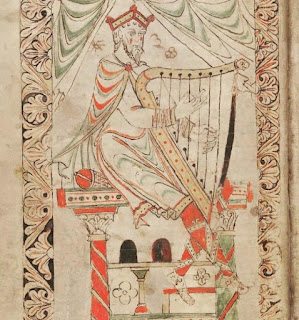 |
| St. Wulfstan Playing the Harp like King David, from a 13th Century Anglo-Saxon Illustrated Manuscript |
By Bp. Joseph (Ancient Church of the West)
On the 19th of January, we celebrate the Feast Day of St. Wulfstan, 2nd Bishop of Worcester by that name, the last surviving English pre-Conquest Bishop who tried to maintain communion with the Orthodox in the East.
As a monk, St. Wulfstan was a Benedictine Brother in Worcester, eventually ordained a priest, and became a bookkeeper for his monastery. He gained a reputation for honesty and humility, being called “the guileless Israelite”, and his quick intellect and piety made many friends within the Church and the secular court. In AD 1062, during the last years of Edward the Confessor, he was consecrated as the Bishop of Worcester, despite his own efforts to escape the nomination. He was such a good administrator and peacemaker, known as a fair minded and just judge, that he became the only Bishop to remain after the Norman Conquest by William the Conqueror. His status was due only to the favor he found in the sight of the King, who compared him to St. Daniel serving Darius in the Old Testament.
 |
| A Reconstruction of an Ancient Stained Glass Icon of St. Wulfstan |
 |
| A Small Parish Church Window in Warwickshire, Dedicated to St. Wulfstan |
 |
| An Illuminated Page from One of St. Wulfstan’s Psalters |
 |
| Illustration of St. Wulfstan and the Geese |
 |
| St. Wulfstan Negotiating with the Normans During the Conquest |
 |
| A Later Hagiography on St. Wulfstan, Printed in Germany, Wearing Contemporary European Clothing from the 17th Century |
 |
| An Early Icon Taken to Represent St. Wulfstan in Youth |
 |
| Canterbury Cathedral Stained Glass Panel of St. Wulfstan |
 |
| Ely Cathedral Stained Glass Depiction of St. Wulfstan Negotiating with the Normans |
St. Wulfstan rebuilt his cathedral after its destruction by fire during the Conquest, fed the starving, looked after the fatherless, and plead for mercy and reprieve for the Saxon and Celtic Peasants with their Norman overlords. He died in AD 1095, after a protracted illness. He was the last Bishop in a lineage of native Celtic episcopacy, the last Bishop in communion with the Orthodox East, and the last Bishop to be a native born Englishman during the years of Norman oppression. It would be almost a century before the native sons of Britannia would be elected to the episcopacy again.
St. Wulfstan died in old age while washing the feet of the poor who came to his cathedral, bending down in kindness and compassion, only to stand up again in the Kingdom of God. After his death, many miracles were attributed to his relics, and his fame spread far and wide in both East and West.
COLLECT
ALMIGHTY GOD, Whose only-begotten Son hath led captivity captive and given gifts to Thy Church: Multiply among us faithful priests, who, like thy holy Bishop Wulfstan, will give courage to those who are oppressed and held in bondage; and through St. Wulfstan’s intercession, bring us all, we pray, into the true freedom of Thy kingdom; through Jesus Christ our Lord, Who liveth and reigneth with Thee and the Holy Ghost, ever One God, world without end. Amen.
Pray for us, Mighty English Pillar of Orthodoxy!












Comments
Post a Comment